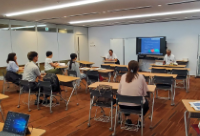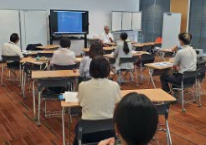研究者としての倫理観を醸成するため、研究推進センターが初の「研究倫理塾」を開講しています。
| お知らせEnglish below.
研究不正に警鐘を鳴らし、研究者としての倫理観をグループワークや講義で再認識する「研究倫理塾」が9月21日から10月19日まで3回にわたり開講されています。毎回、教授職から若手研究者まで約20人が参加。近年、特に日本において多発する捏造や盗用などの研究不正とそのリスクを知り、研究者としての心構えを再認識して信頼される研究リーダーの育成を目指しています。
「ダイバーシティ研究環境実現イニシアティブ(女性リーダー育成型)」事業の一環として、研究推進センターが初めて実施しました。第1回は河合優年副学長(研究担当)が研究倫理について概説。「研究に公正さを求めるルールである以前に、人は本来的に不正行為を嫌うもの。研究倫理は真の意味での倫理観に結びついている」と話しました。
第2回は文部科学省の定める研究活動上の不正行為であるところの捏造、改ざん、盗用以外のグレーゾーンの行為について動画等で学び、グループワークで討議しました。 10月19日に最終回を開催予定。研究推進センターでは次年度以降も引き続き研究倫理教育を実施し、研究者自身が自らを省みる機会を提供する予定です。
The “Research Ethics School” has been held three times from September 21st to October 19th to warn against research misconduct and to reaffirm the ethics as a researcher through group work and lectures. Each session is attended by approximately 20 participants, ranging from professors to young researchers. The aim of the course is to learn about research misconduct such as fabrication and plagiarism, which have been occurring frequently in Japan in recent years, and the risks associated with such misconduct, and to develop trusted research leaders by reaffirming the mindset of a researcher.
This is the first time that the Center for Research Promotion has conducted this program as part of the “Initiative for Realization of Diversity Research Environment (Female Leader Development Type)” project. In the first session, Masatoshi Kawai, Vice President for Research, gave an overview of research ethics. She explained that, “Before research ethics is a rule that demands fairness, people are inherently averse to misconduct. Research ethics is tied to a true sense of ethics,” he said.
In the second session, participants learned about gray-area activities other than fabrication, falsification, and plagiarism, which are considered misconduct in research activities by the Ministry of Education, Culture, Sports, Science and Technology, through videos, etc., and discussed them in group work.
The final session is scheduled to be held on October 19th. The Center for the Promotion of Research will continue to conduct research ethics education in the next fiscal year and beyond, providing researchers with opportunities to reflect on themselves.

